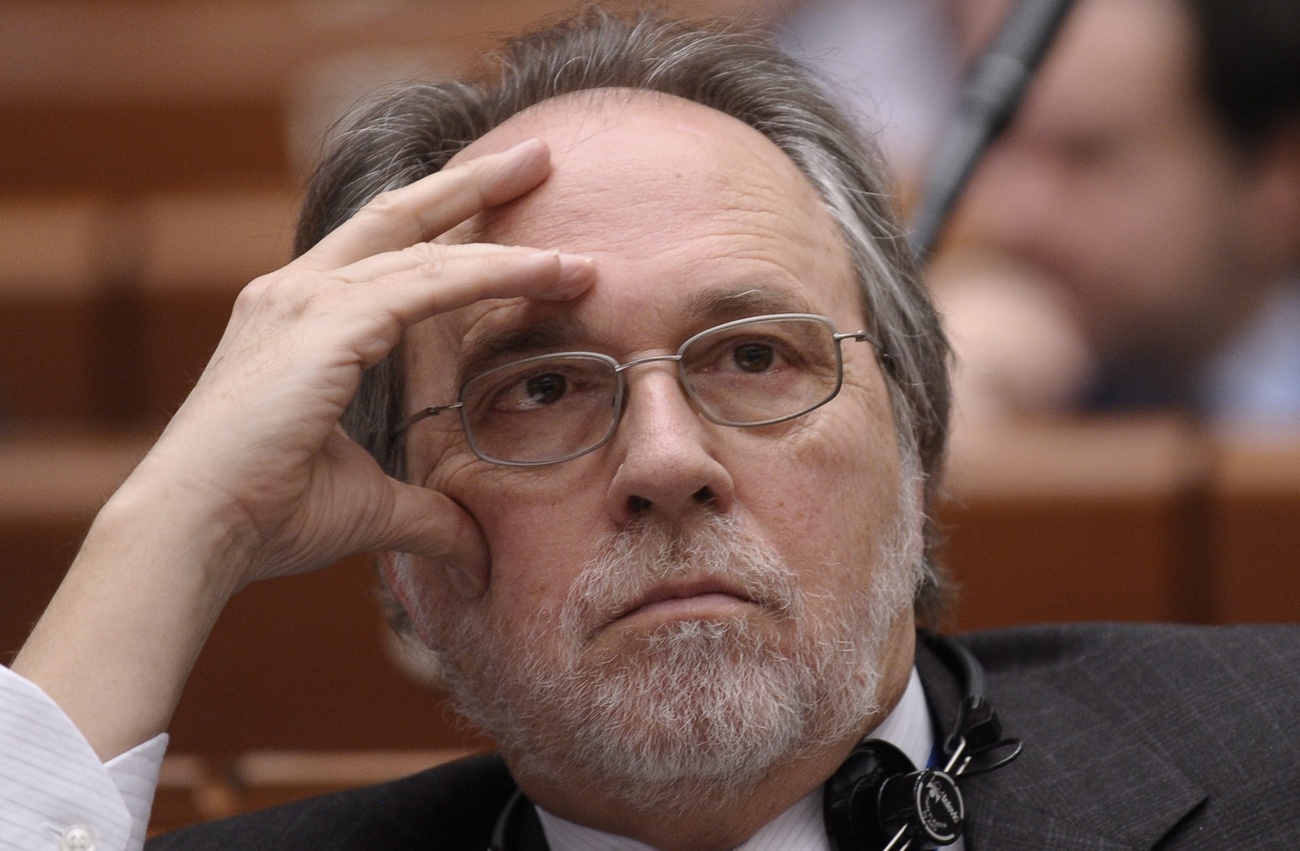
Ex-Swiss prosecutor Dick Marty on politics, truth and his ‘last battle’

In a new book, former Swiss senator and prosecutor Dick Marty looks back at the economic and political crises that have hit Switzerland. He talks to Swiss public television RSI about his motivations for writing the book and Switzerland’s global role in a world of multiple conflicts.
The interview coincides with the launch of Marty’s latest book, Verità irriverenti. Riflessioni di un magistrato sotto scorta (Irreverent Truths: Reflections of a Magistrate under Escort) published by Edizioni Casagrande.
Born in 1945 in the southern canton of Ticino, where he served as deputy public prosecutor, then public prosecutor from 1975-1989. A member of the Ticino cantonal government from 1989 to 1995.
Elected to the Swiss Senate in 1995, he was a member of the centre-right Radical Party. He stepped down in 2011. Among his initiatives: installing an independent federal prosecutor, and the decriminalisation of abortion.
He was elected to the Council of Europe parliamentary assembly in 1999 and chaired the Committee on Legal Affairs and Human Rights from 2005 to 2008. He retired in 2011.
On behalf of the committee, he investigated the CIA’s secret prisons in Europe, publishing a report in 2006 that said 14 countries had colluded with the US in a “spider’s web” of human rights abuses. Marty said other countries, including Switzerland, had been involved actively or passively in the detention or transfer of unknown persons.
In 2010 he published a report on suspected organ trafficking in Kosovo, which implicated high-ranking members of the Kosovo Liberation Army (KLA). The latter investigation was apparently the catalyst for an alleged assassination order against Marty from Serbia, which has never accepted the formation of an independent Kosovo.
In the book, the former Swiss senator and prosecutor revisits some of the key moments in his political career, including the months spent under armed guard due to serious threats linked to his investigations for the Parliamentary Assembly of the Council of Europe in 2009-2010 that focused on alleged organ trafficking in Kosovo.
RSI: What led you to publishing this book?
Dick Marty: The book was born out of a reaction to a very strong emotional event. It was my way of dealing with this emotion. Overall, it was a reflection on the functioning of institutions and the degradation of democracies throughout the Western world, and on our failure to react to major events. The entire international balance is shifting towards a clear weakening of the West, but I fear that our political system is once again slow.
RSI: What do you mean by slow?
D.M.: If you look back at the Holocaust assets controversy, the Swissair crash, banking secrecy, or the UBS or Credit Suisse bank scandals, you see that politicians always reacted late. Or rather, they reacted but did not anticipate events, even if the warning signs were there in each one of these cases.
RSI: How should Switzerland position itself in this constantly changing world?
D.M.: If Switzerland wants to play a special global role, it must concentrate on humanitarian policy and the politics of values and human rights. The International Committee of the Red Cross (ICRC) must be urgently re-evaluated. It should be the global voice that reminds people of the values of human dignity.
RSI: Should Switzerland continue to be a neutral state?
D.M.: In the Ukraine crisis there has been a big debate about neutrality and whether Switzerland should export arms. There has been pressure from many sides. It has been necessary to commit to being a mediator, to seeking compromises and to protecting the civilian population, and the same thing is happening in the Middle East.
RSI: The book also arose out of a difficult time in your life. You speak of a new challenge that you believe you cannot overcome. Is this book a general look back at your life?
D.M.: It’s not an overall assessment because there are many other things in my life, such as my family, which I see as my greatest success. But it is a reflection that I wanted to do for myself. When you are in politics, you end up running from one appointment to the next, and I have the impression that there is less and less time for reflection. I felt an urgency because I face the challenge of an internal enemy against which the chances of winning are practically zero.
Click on the video below to watch the entire RSI interview in Italian:

In compliance with the JTI standards
More: SWI swissinfo.ch certified by the Journalism Trust Initiative



























You can find an overview of ongoing debates with our journalists here . Please join us!
If you want to start a conversation about a topic raised in this article or want to report factual errors, email us at english@swissinfo.ch.